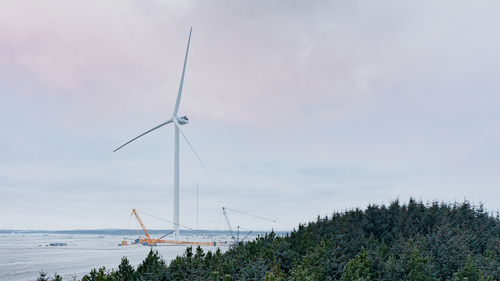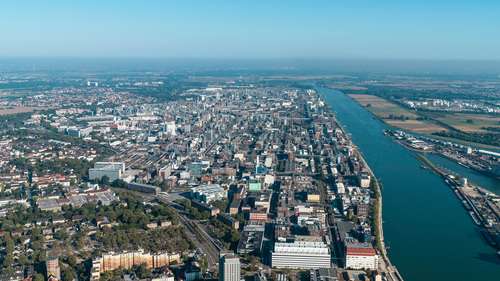Vattenfall and BASF sign contract with Vestas for latest 15 MW offshore wind turbines in Germany
Vattenfall and BASF have signed supply and service contracts with Vestas for 112 wind turbines of the type V236-15.0 MW. The state-of-the-art turbines will be used in the Nordlicht 1 and 2 offshore wind projects owned by Vattenfall and BASF in the German North Sea off the island of Borkum. From 2028, they will be able to produce electricity for the equivalent of 1.6 million households. Parts of the wind turbine towers will be fabricated with low-emission steel, significantly reducing the carbon footprint of the towers.
The turbines are to be erected in the Nordlicht wind farm area – 68 wind turbines for Nordlicht 1 and 44 wind turbines for Nordlicht 2. With a nominal output of 15 MW, the V236 is currently the most powerful wind turbine available on the offshore wind turbine market.
Nils de Baar, President of Vestas Northern and Central Europe, says: “We are pleased to have signed this conditional contract to deliver our state-of-the-art offshore wind turbine for the Nordlicht project. Vattenfall, BASF and Vestas share the ambition to rapidly expand wind projects and to decarbonize the energy market in Europe, and Nordlicht will play a crucial role in delivering Germany’s energy transition targets. Vattenfall has a lot of experience in offshore wind projects, and we are looking forward to build this project together with our partners.”
Catrin Jung, Head of Offshore Wind at Vattenfall, comments: “Wind energy is an essential cornerstone on the path to fossil freedom, which moves society forward. With Vestas, we now have a partner for our Nordlicht projects at our side, with whom we share the same values in terms of sustainable energy solutions. The wind turbine supply and service contracts are an important milestone for us, and we look forward to continuing to work with Vestas as one of the leading wind turbine manufacturers.”
Horatio Evers, Managing Director at BASF Renewable Energy GmbH, adds: “Renewable energies play a key role in our efforts to achieve net-zero CO2 emissions as soon as possible. This agreement is another important milestone in the Nordlicht 1 and 2 offshore wind projects and shows our clear commitment to the European wind power supply chain. Sustainability is an integral part of our strategy, and I am delighted that by using low-emission steel, we are also demonstrating that sustainable products are the future.”
Low emission steel towers reduce CO2 footprint significantly
The companies are also underlining their ambitions to reduce their CO2 emissions along the entire value chain. The top sections of 56 out of 112 towers will be made with low-emission steel, accounting for 24 percent of the mass of the heavy steel plates used for the wind farm area and leading to a 16 percent reduction in the towers' carbon footprint. Low-emission steel is fabricated using 100 percent steel scrap melted in an electric arc furnace powered by 100 percent wind energy, reducing the carbon footprint by 66 percent compared to heavy steel plates made via a conventional steelmaking route.
The Nordlicht wind farm area
The Nordlicht wind farm area is located 85 kilometres north off the island of Borkum in the German North Sea and consists of two separate locations: Nordlicht 1 with a capacity of around 980 megawatts and Nordlicht 2 with around 630 megawatts. Once fully operational, electricity production is expected to total around 6 terawatt hours (TWh) per year. Subject to the final investment decision, the construction of Nordlicht 1 and 2 is scheduled to start in 2026. According to the current state of planning, the wind turbines are to be erected in 2027 (Nordlicht 1) and 2028 (Nordlicht 2). The wind farms are expected to be fully operational in 2028.
Partnership of Vattenfall and BASF
BASF holds a 49 percent stake in the Nordlicht 1 and 2 wind farm projects. The Nordlicht wind project is being built in the German North Sea without state subsidies and, with a total installed capacity of 1.6 gigawatts, is the largest offshore wind farm project that Vattenfall has implemented to date. Vattenfall is developing and building the Nordlicht sites and intends to use its share of future electricity generation to supply customers in Germany with fossil-free electricity. BASF will use almost half of the electricity to supply its chemical production sites in Europe, especially in Ludwigshafen.
Categories
Countries
Companies
Latest news
Hycamite’s technology to decarbonize shipping awarded AiP by industry leader DNV
Kokkola Industrial Park →Hycamite’s proprietary Thermo-Catalytic Decomposition (TCD) technology offers a new approach to producing clean hydrogen by breaking down methane, the primary component of liquefied natural gas (LN...
Clariant catalysts will power the Ecoplanta: Europe's first waste-to-methanol plant
Chemmed Cluster Tarragona →Repsol is building Europe’s first plant to produce renewable methanol from urban waste The facility will use Enerkem gasification technology to produce 240 KTA of methanol Clariant will supply cata...
Lilly plans to build a new $3 billion facility to boost oral medicine manufacturing capacity in Europe for patients worldwide
Netherlands site will bring 500 manufacturing and 1,500 construction jobs while further strengthening Lilly's global supply chain
Ports of Duisburg and Rotterdam advance energy transition together
Port of Rotterdam →With this LoI, the two major European logistics hubs reinforce their goal of jointly developing sustainable transport corridors via waterways as well as future-oriented initiatives for the energy t...


